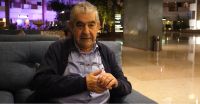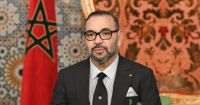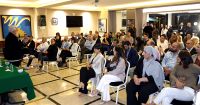A march in Dresden that drew 10,000 people has capped a winter of anti-immigration demonstrations in Germany’s cities and prompted condemnation from a nervous government.
The Dresden rally, which wound through the east German city’s baroque historic quarter on Monday night, was the largest to date of a series of such gatherings, and attests to rising tensions in Germany over an issue fuelling populist parties across Europe.
It was organised by a group called the “Patriotic Europeans Against the Islamization of the West”, or Pegida, and featured the slogan “Wir sind das Volk” – “we are the people” — the rallying cry of historic protests against East Germany’s Communist rulers. A rally organised by the same movement in Düsseldorf drew about 400 on Monday night.
Heiko Maas, the justice minister, spoke out against the protests on Tuesday, telling local media: “There are limits to political differences of opinion. All political parties should clearly distance themselves from these protests.”
This week’s protests follow recent incidents of unrest and extremism on German streets that are worrying authorities. The autumn featured violent clashes between police in Cologne and a group of football hooligans and far right supporters, some of whom gave Hitler salutes and chanted neo-Nazi slogans as they protested against Salafism in Germany.
The Dresden rallies, by contrast, have been notable for their restraint and moderate slogans.
The leader of Pegida, Lutz Bachmann, is a 41-year-old businessman who says his protests aim to stem the growth of the far right. “Because of a misjudged asylum policy the French and the Dutch are voting for radical rightwing parties, and these parties are becoming stronger all the time,” he told the Financial Times. “It’s said that we are Nazis. To the contrary — that’s exactly what we’re against.”
Mr Bachmann, who runs a graphics and design agency in Dresden, said he supported the right to political asylum. He is calling for an immigration policy “after the model of Canada or Switzerland” to encourage skilled labour while curbing economic migration.
Underlining demands for greater assimilation, Mr Bachmann said there should be a “duty to integrate”, saying: “If I want to emigrate to America, I’d be obliged to learn English. I’d be obliged to introduce myself to the culture."
The demand for curbs on migration has grown louder in Germany, which is now the second-most popular destination for migrants in the world after the US.
For decades under Communism, East Germany was isolated from changes taking place in the west, where large-scale migration transformed many cities. Just 2 per cent of the population is of foreign origin in Saxony, the state of which Dresden is capital, below the German average of 8 per cent.
Concerns over immigration in east Germany, where non-white faces remain a rarity, may be insecurity at one remove, according to Werner Patzelt, a politics professor at Dresden’s Technical University. “People look at parts of North Rhine-Westphalia or Berlin, where the proportion of foreigners isn’t 2 per cent but 5 per cent or higher. And they say, in Saxony — are these conditions really desirable?” he said.
German cultural anxieties over integration have found political expression in recent weeks in a contentious proposal for immigrants to speak German at home, and a demand from MPs in Angela Merkel’s Christian Democrat party for a ban on the burka.
Bernd Lucke, leader of the eurosceptic party Alternative für Deutschland, expressed sympathy with the Pegida movement on Tuesday. The AfD has combined anti-euro rhetoric with calls for restrictions on immigration, notching up a series of strong election results in regional votes this autumn.
Pegida says it plans to keep marching every Monday until its demands are met, and is blending concerns over domestic security with anxieties about the rise of political correctness.
Mr Bachmann said: “Our beloved Christmas markets will become Winter markets, so as not to injure religious feelings. The word ‘Moor’, which is in children’s books for hundreds of years, has to be changed. It should disappear from our language. It’s simply wrong.”
Mr Patzelt, the politics professor, suggested that suspicion towards migrants stemmed from a German sense of insecurity.
“German society is a society lacking in self-confidence,” he said. “It’s a society that can’t imagine that someone would gladly want to be German. With this background, an immigrant is perceived not as someone who wants to belong, but someone who wants to make use of the advantages of the country.”/FT.com





